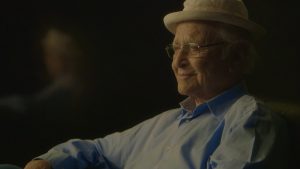LEAR: KING OF THE 1970s SITCOM
“Maybe [people] continued to agree with Archie Bunker – as I said earlier, you can’t change people’s minds, but you can get them to think.” – Norman Lear
When you think of words to describe 1960s television, one word that won’t come to mind is “edgy”. It’s almost hard to imagine that television prime time was once dominated by the likes of The Flying Nun, Gilligan’s Island, and F Troop. How inconceivable, then, that someone would kick off the 1970s by producing a show about a foul-mouthed, right-wing bigot and his liberal son-in-law arguing about current events −and as a comedy yet. That courage and talent is the legend behind producer and political activist Norman Lear.
Directors Heidi Ewing and Rachel Grady, best known perhaps for their documentaries Jesus Camp and Freakonomics were surprised to learn when they met Lear that the then-92-year-old never had a documentary made about his industry-dominating career. While biography is not their general fashion, they felt Lear was a subject that needed to be covered while he was still around to be interviewed.
Ewing admitted in an interview that it was extremely hard to pick out what to cover in the documentary because Lear’s career goes back to the earliest days of television, writing for the likes of The Colgate Comedy Hour and The Tennessee Ernie Ford Show. In the end, the duo chose to focus on four of Lear’s most prominent 70s’ sitcoms: All in the Family, Maude, Good Times, and The Jeffersons–with a nod to late-night’s quirky Mary Hartman, Mary Hartman. Ewing’s editing challenge becomes clear when one realizes that the film never even mentions two of his hugest hits, Sanford and Son and One Day at a Time (the latter of which had some very serious and fascinating cast issues). Ewing stated that she is comforted by the fact that Lear’s recent autobiography Even This I Get to Experience fills in gaps she could not cover.
The film looks at the moxie Lear shows standing up to the networks time and again on controversial issues. When his script calls for Maude deciding to terminate a pregnancy in her 50s, Lear faces extreme opposition from the network, but stands his ground, explaining to us that if he lost that battle, all the future ones would be harder fought. In the end, tens of thousands wrote letters to complain about Maude’s abortion, but viewership was through the roof and didn’t diminish.
Another interesting insight is the reason why The Jeffersons came to be. Lear struggled regularly with Good Times stars Esther Rolle and John Amos, both of whom felt that TV’s first traditional black family needed to be genuine. Lear walked an uncomfortable line between wanting to be respectful and needing to regularly produce a hit comedy about this poor family. As Black Panthers and others shared the stars’ concerns, The Jeffersons was born out of a desire to also show black Americans who were successful and thriving.
Lear tells us about his dark childhood that forces him to grow up too quickly and begin working as a teenager. This could explain why several who know Lear point out that , even with his 94th birthday just around the corner, you can always feel the little boy in him coming out to play at a moment’s notice. (Leer isn’t done playing, by the way. Netflix just bought the rights to his upcoming Latino remake of One Day at a Time co-starring Rita Moreno.)
The film is quick paced and well-balanced. It would likely hold far less appeal to those who hadn’t spent a decade relishing Archie, Edith, Maude, J.J., George, and Weezy. For those of us who spent countless hours with them, though, it’s a wonderful trip back to the glow of a Zenith or RCA’”this time, with the boost of a peak behind the curtain.
photos courtesy of Music Box Films
Norman Lear: Just Another Version of You
Music Box Films
A Loki Films, Jonathan D. Lewis, American Masters Pictures
USA | English | 2016 | 92 minutes | no rating
in limited release July 8, 2016, after film festivals
for more info, visit Loki





